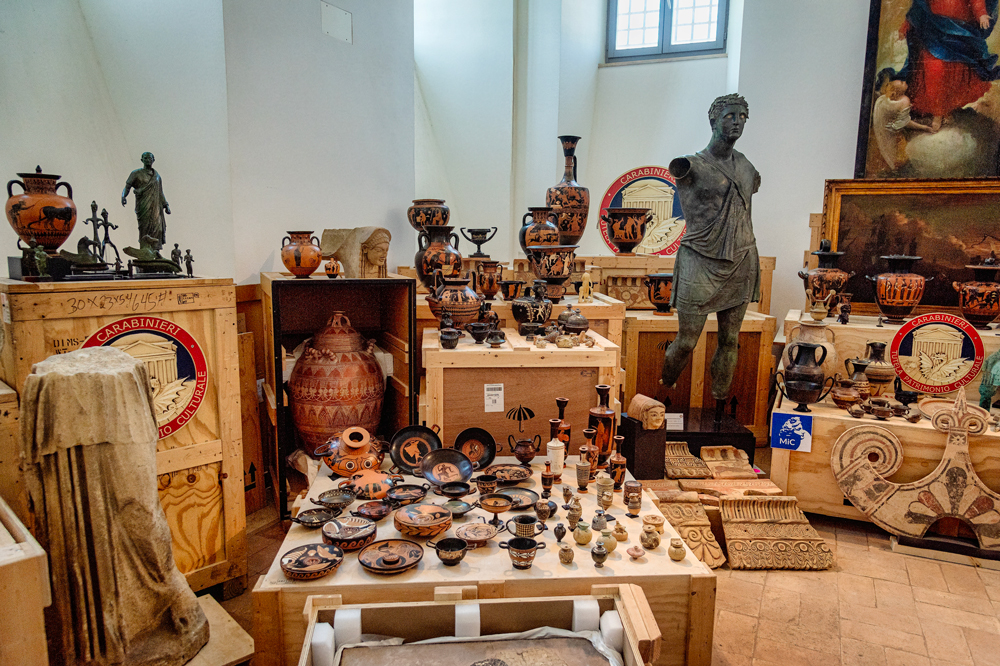More than 600 antiquities, worth around €60m in total, have been repatriated to Italy from the United States. Investigations conducted by the Carabinieri Command for the Protection of Cultural Heritage (better known as the Carabinieri Art Squad), with assistance from the New York District Attorney’s Office and Homeland Security Investigations, turned up hundreds of looted objects that were held in galleries, auction houses and private collections throughout the United States. The repatriated objects date mostly from the 9th century BC to the 2nd century AD. They include a 4th-century silver coin with the faces of the god Dionysus and the satyr Silenus on either side, which was put on sale in the United States last year for $500,000. Absent among the returned items is the ancient Greek statue Victorious Youth, currently on display at the Getty in Los Angeles, despite the European Court of Human Rights ruling earlier this month that Italy had the right to reclaim the statue. Also in restitution news, the Cleveland Museum of Art (CMA) has agreed to return a 2,200-year-old Egyptian statue to Libya, after acknowledging that the statue was likely looted during the Second World War. It will, however, remain on view at the CMA as a loan for ‘a few years’, with a label describing Libya as the statue’s rightful owner.
The classical archaeologist and art historian John Boardman has died at the age of 96. Boardman, who was a member of Apollo’s editorial advisory panel, was described in a 2006 profile in the magazine as ‘the most distinguished British art historian of the classical world’. Born in Essex in 1927, and educated at Cambridge, he went on to author some 45 books – and co-authored many more – on the art and culture of the ancient world. Though his specialisms were Greek engraved gems and painted vases, he also explored broader themes in books such as The World of Ancient Art (2006) and, most recently, Alexander the Great: From His Death to the Present Day (2019). As a scholar, Boardman was renowned for his rigour, and for his theory that divided the art of the ancient world according to the climate in which it was produced. Boardman was the Lincoln Professor of Classical Art and Archaeology at the University of Oxford from 1978 to 1994, when he became an emeritus professor; for Boardman, retirement meant another 30 years of work. Among the many accolades received across his seven-decade career were the Kenyon Medal from the British Academy, in 1995, and the Onassis Prize for Humanities, in 2009. He was knighted in 1989.
The Imperial War Museum wants to stop recognising two unions. Françoise Harris, executive director for collections and governance, reports the Art Newspaper, wrote to the Public and Commercial Services (PCS) union and the First Division Association (FDA) to inform them that the museum would be recognising only Prospect, one of three unions that currently represent staff at the museum group. The PCS represents lower-paid staff, the FDA tends to represent staff in management positions, and Prospect acts largely on behalf of those who work as curators. Harris’s letter to the unions came after the results of a management survey of staff in the IWM’s trading arm, which comprises the group’s shops and cafés, revealed that 80 per cent of respondents to the survey said they wanted union representation.
The hacker group RansomHub is claiming responsibility for the recent cyber-attack at Christie’s. In a post on the dark web on Monday, reposted on X by cybersecurity analyst Brett Callow, the group stated that it possesses personal information belonging to 500,000 of Christie’s private clients around the world. It also claimed that it would release this information if its ransom had not been paid by the end of today. A memo circulated yesterday by Christie’s to its clients confirmed that full names and passport numbers had been compromised, but that the hacking group – which has not yet been confirmed to be RansomHub – has not been able to access clients’ financial details, ID photographs, signatures or contact details. The cyber-attack put Christie’s website out of action on 9 May. The disruption lasted around a week and a half, and was ongoing during Christie’s May auctions – but buyers were undeterred, with the auction house’s two evening sales of contemporary and 20th-century art together bringing in $528m.
Sotheby’s is planning to lay off dozens of employees in London. Four anonymous sources have told the Art Newspaper that around 50 people in the capital will lose their jobs as a result of a planned restructuring, with further job losses expected in New York and continental Europe. One source has said that director-level and art-handler roles are being re-evaluated in the restructuring. Profits for Sotheby’s UK arm fell 24 per cent between 2021 and 2022, though a Sotheby’s spokesperson stated at the time that this did ‘not represent the financial view of our full global enterprise or even our UK business in aggregate’. Sotheby’s has been owned by the billionaire Patrick Drahi since 2019, whose telecoms empire is underpinned by $60bn of debt. The auction house has denied rumours that it is planning to sell its London headquarters: one spokesperson says, ‘London is and will continue to be our largest and most important centre for sales, exhibitions and talent in Europe and our second biggest sales location in the world.’



